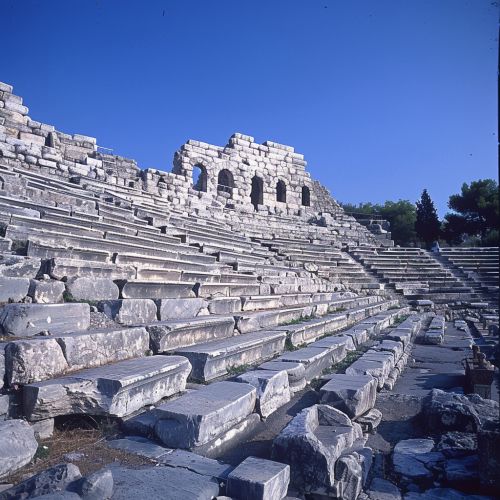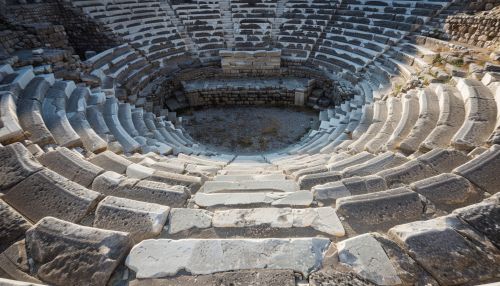Poetics (Aristotle)
Introduction
"Poetics" is a seminal work of literary theory and criticism by the ancient Greek philosopher Aristotle. Composed around 335 BCE, it is the earliest surviving work of dramatic theory and the first extant philosophical treatise to focus on literary theory. Aristotle's "Poetics" primarily addresses the principles of tragedy, which he considers the highest form of poetry. The work is foundational in the Western literary canon and has profoundly influenced subsequent literary criticism and theory.
Structure of Poetics
The "Poetics" is divided into several sections, each dealing with different aspects of literary theory. These sections include definitions and classifications of poetry, the components of tragedy, and the nature of mimesis (imitation).
Definitions and Classifications
Aristotle begins by defining poetry and its various forms, including epic poetry, tragedy, comedy, and dithyrambic poetry. He distinguishes these forms based on their means of imitation, objects of imitation, and manner of imitation. For instance, tragedy and epic poetry both use verse to imitate noble actions, but they differ in their manner of imitation, with epic poetry employing a narrative form and tragedy using dramatic form.
Components of Tragedy
Aristotle identifies six essential components of tragedy: plot, character, thought, diction, melody, and spectacle. He argues that the plot is the most important element, as it is the structure of the incidents and the foundation of the narrative. Characters are secondary, serving to advance the plot. Thought refers to the themes and messages conveyed by the characters, while diction pertains to the choice of language. Melody and spectacle are the musical and visual elements, respectively, which enhance the overall impact of the tragedy.
Plot and Character
Aristotle's analysis of plot and character is one of the most detailed sections of the "Poetics." He emphasizes the importance of a well-constructed plot, which should have a beginning, middle, and end, and should follow the principles of unity and coherence. The plot should also include elements of peripeteia (reversal of fortune) and anagnorisis (recognition or discovery), which contribute to the emotional impact of the tragedy.
Unity of Action
Aristotle insists on the unity of action, meaning that the plot should be a complete and self-contained whole, with all incidents logically connected. He criticizes episodic plots, where incidents are not causally related, as they fail to produce a unified and coherent narrative.
Character Development
Characters in a tragedy should be noble and morally upright, but not perfect, as their flaws contribute to their downfall. Aristotle introduces the concept of hamartia, often translated as a tragic flaw or error in judgment, which leads to the protagonist's demise. This flaw evokes pity and fear in the audience, leading to the cathartic experience that Aristotle deems essential to tragedy.
Mimesis and Catharsis
Aristotle's concept of mimesis, or imitation, is central to his theory of poetry. He argues that all forms of poetry are imitations of human actions, and that this imitation is a natural human instinct. Through mimesis, poetry can represent reality and evoke emotions in the audience.
Catharsis
One of the most debated aspects of Aristotle's "Poetics" is his concept of catharsis. Aristotle posits that tragedy, through the arousal of pity and fear, achieves the purgation or purification of these emotions. This cathartic effect is what makes tragedy a powerful and transformative experience for the audience.
Influence and Legacy
Aristotle's "Poetics" has had a profound and lasting impact on Western literary theory and criticism. During the Renaissance, scholars such as Lodovico Castelvetro and Julius Caesar Scaliger revived and expanded upon Aristotle's ideas, solidifying the "Poetics" as a cornerstone of literary theory. The work has also influenced modern literary critics and theorists, including Northrop Frye and Mikhail Bakhtin.
Renaissance and Neoclassical Periods
During the Renaissance, Aristotle's "Poetics" was rediscovered and translated into Latin and vernacular languages. This revival led to the development of neoclassical literary theory, which emphasized the principles of unity, decorum, and verisimilitude derived from Aristotle's work. Playwrights such as Pierre Corneille and Jean Racine adhered to these principles in their tragedies, striving to achieve the ideal form of drama as outlined by Aristotle.
Modern Literary Criticism
In the 20th century, Aristotle's "Poetics" continued to influence literary criticism and theory. Northrop Frye's Anatomy of Criticism draws on Aristotelian principles to develop a comprehensive framework for literary analysis. Mikhail Bakhtin's concept of dialogism and the carnivalesque also engage with Aristotelian ideas, particularly the notion of mimesis and the role of the audience in interpreting literary works.
See Also


